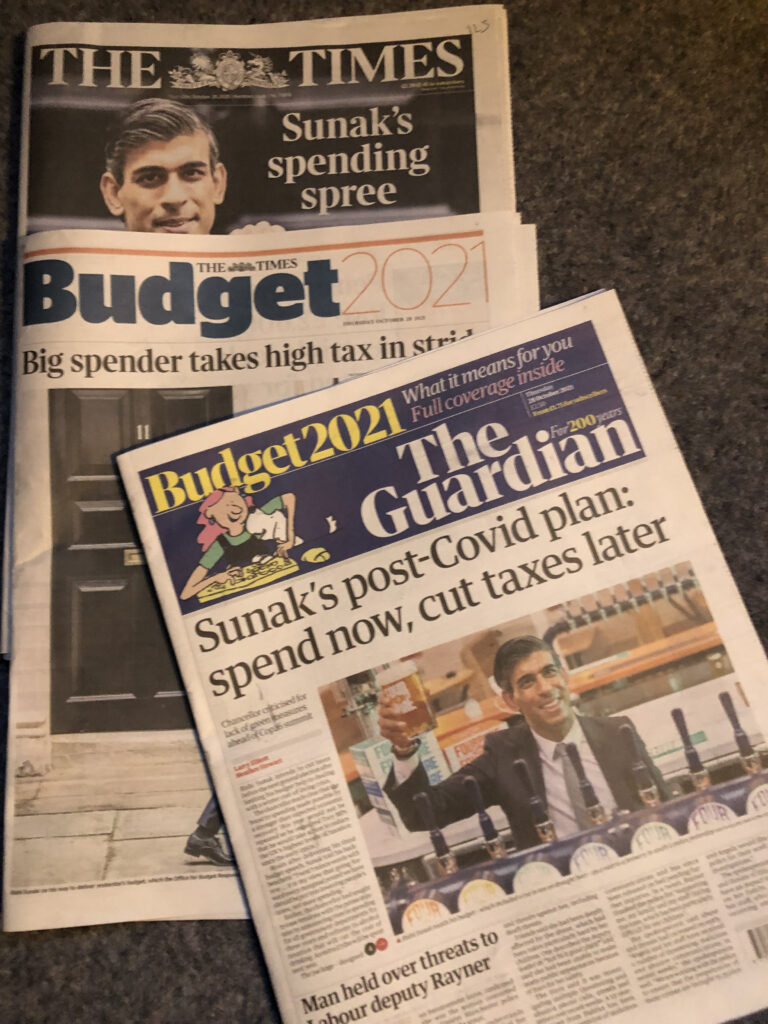There had been much speculation before Wednesday’s budget as to which philosophy would prevail when the chancellor, Rishi Sunak, stood up to address the House of Commons: trimming taxes in line with traditional Tory beliefs or spending big in order to appease the prime minister Boris Johnson’s eagerness to keep sweet his precious ‘Red Wall’ voters. In the end, the tax-cutters were told they would have to wait. I guess we should have guessed as much given that a week previously No. 10 had backed the business secretary, Kwasi Kwarteng, when he railed against the Treasury’s reluctance to provide backing for business in light of the sudden huge spike in energy prices.
After his speech, Sunak told Conservative backbenchers: “I won’t mince words with you. It is my view that going forward every marginal pound we have should be put into lowering people’s taxes, not more spending.” But that was for the future. Now was about spending more money across government, leading to the highest tax burden since the immediate post-war Labour government of Clement Atlee.

Some commentators were baffled. In The Times, Henry Zeffman explained the possible confusion of some Tory MPs like this. Noting that Sunak had told the House: “Do we want to live in a country…when every time prices rise, every time a company gets into trouble, every time some new challenge emerges, the answer is always: the taxpayer must pay?”, his tax-cutting fans would be thinking why on earth had they ended up being served “a bizarre rebuttal of what he had just announced”. Paul Johnson (definitely no relation!), director of the Institute for Fiscal Studies, said: “This really is a big taxing, big spending government.” He added: “In March, when it looked like the long-term costs of Covid-19 would be big and that borrowing would be high, he [Sunak] raised taxes. This month, the forecasts are a lot stronger [but] instead of using those tax rises to keep borrowing under control he is going to use much of them to increase spending.”
If members of Sunak’s own party were bound to have some misgivings, one would naturally expect the opposition to have more. The Labour Party leader, Keir Starmer, accused Johnson and Sunak of operating “a classic con game – the prime minister is the front man, distracting people with his wild promises; all the while, his chancellor dips his hand in their pocket”. Starmer had tested positive for covid on Wednesday morning, which meant the opposition’s response in the House was left to the shadow chancellor, Rachel Reeves. She said Sunak wasn’t addressing any of the issues faced by millions of voters – “they won’t recognise the world that the chancellor is describing; they will think he is living in a parallel universe” – and she highlighted two of his tax breaks, on fizzy drinks and domestic flights, by saying: “At least the bankers on short-haul flights sipping champagne will be cheering this budget today.”
Quite how anyone can make sense of making internal flights cheaper when the UK is about to host a summit on the challenges of worldwide climate change is beyond me. We shall see if we get a good Cop26 or a bad Cop26.
